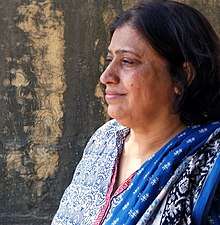Attiya Dawood
Attiya Dawood (Urdu: عطیہ داؤد b. April 1, 1958[1]) is a Sindhi poet, writer, feminist and activist. She was born in Moledino Larik (a small village in Naushero Feroze, Sindh, Pakistan)[2][3] She has been hailed as one of the most important feminist Sindhi writers of her time.[2] Dawood uses her poetry to highlight the oppression of women in Sindhi society in the name of tradition. She has been writing poetry since 1980.[3]
Attiya Dawood | |
|---|---|
عطیہ داؤد | |
 Dawood in 2012 | |
| Born | April 1, 1958 |
| Nationality | Pakistani |
| Occupation | Poet, writer, feminist, activist |
Early life
Attiya Dawood moved to Karachi in 1975, and has been writing poetry regularly since 1980.[3][2] Her father was a school teacher, a poet and a Hafiz.[3][4]
She changed her name from Attiya Larik to Attiya Dawood in the early 1970s.[3] Her first poem, published in a Sindhi-language newspaper, received a negative reaction from her brothers; as a result she changed her name.[3]
Dawood's biography Ainay kay Saamnay was published by Oxford University Press in 2009. An earlier version was published in Hindi in India in 2000 by Rajkamal Prakashan.[4] Dawood wrote the story of her life during a residency at the Sanskriti Kendra in New Delhi,[3][2][4] an institution that supports artists.[5][6]
Selected works
Attiya Dawood has numerous publications to her credit. She writes mostly in Sindhi. She draws inspiration from her traumatic girlhood experiences in rural Sindh.[7][4] Her poems have been translated into German, English and Urdu.[8] Her poetry is noted for its sincerity and zeal.[9]
| Year | Title | Publisher | Notes |
|---|---|---|---|
| 1995 | Raging to be Free | Maktab-e-Danyal, Karachi | English translation by Asif Farrukhi |
| 1997 | Sharafat Jee Pulsarat | Suhaee Books | Sharafat Ka Pul-e-Sarat - Urdu translation by Fahmida Riaz |
| Aap ka jism aur sehat | Wada Kitab Ghar | ||
| 2001 | Sindhi aurat kee kahani | Seen Publishers | |
| 2002 | Sindh ki aurat sapney sai such tak | Shehrazad | |
| 2002 | Un poori chadar | Koonj Publications | |
| 2009 | Ainay kay Saamnay | Oxford University | Autobiography |
| Title | Urdu | German | English |
|---|---|---|---|
| Sharafat Jee Pulsarat | Sharafat Ka Pul-e-Sarat | Der schmale Steg der Ehre | |
| Amar Geet | Amar Geet | A Song Everlasting | |
| Safar | Die Reise | ||
| Be-rang Tasveer | Farbloses Bild | ||
| Preet Ji Reet | Geschichte der Liebe |
Selected awards
| Year | Title | By | Notes |
|---|---|---|---|
| 2001 | Sindhi Adeeb Award | Akhil Bharat Sindhi Boli and Sahit Sabha, India | Two literary sittings conducted in her honor at the Sahitya Academy,
Bhopal, November 2001 |
References
- User, Super. "Attiya Dawood (Member)". www.iefsindh.org. Retrieved 2017-09-11.
- "T2F » In Their Own Voice: Attiya Dawood". www.t2f.biz. Retrieved 2017-09-11.
- "URDU LITERATURE: Story of a lifetime". DAWN.COM. 2010-01-31. Retrieved 2017-09-11.
- Baloch, Saher (2013-12-19). "Diary of a six-year-old's pastoral experiences". DAWN.COM. Retrieved 2017-09-11.
- "Sanskriti Kendra". www.sanskritifoundation.org. Retrieved 2017-09-11.
- "Rebellion in Writing: Pakistani Author Attiya Dawood". REVOLUTIONS IN MY SPACE: A BLOG BY RITA BANERJI. 2010-11-12. Retrieved 2017-09-11.
- Editor, Chief (2010-12-05). "Who is who in Pakistan: Attiya Dawood". Who is who in Pakistan. Retrieved 2017-09-11.CS1 maint: extra text: authors list (link)
- "Poets translating Poets - Poets - Goethe-Institut". www.goethe.de. Retrieved 2017-09-11.
- "Attiya Dawood & Her Writings: Feminist writings by Pakistan's leading activist-poet". www.geocities.ws. Retrieved 2017-09-11.